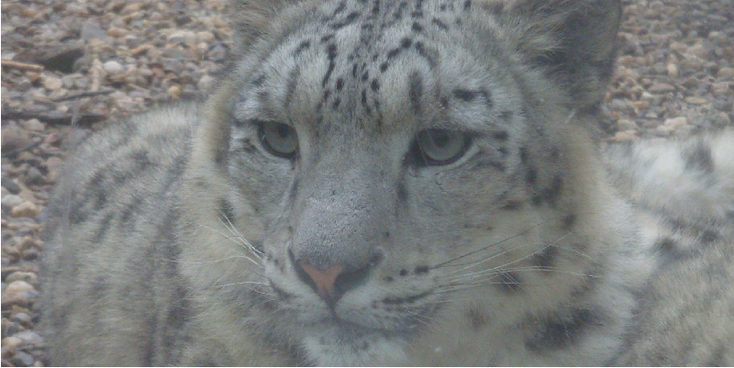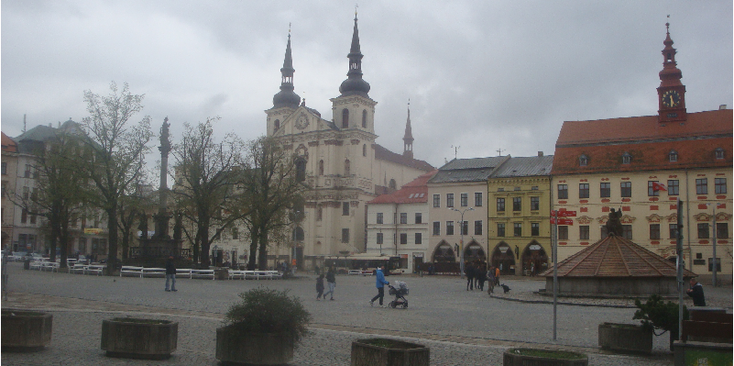Jihlava
Travel Stories - Czech Republic

Sleeping options

It is one clock afternoon when I arrive at a large bus station in Jihlava where I have to look for the bus-station-building that goes with it. Totally disoriented I go looking for the center of the city. My travel guide is 10 years old and I'm not going to gamble - the plan is to go to the information center and ask for cheap overnight options.
I have read that Jihlava is an industrial city (formerly with silver mines) but I don’t see antyhing I’m looking for on the route to the old center. On the other hand I see some beautiful baroque houses on both sides of the road. Via a busy shopping street I end up on a gigantic square ("Masaryk") which unfortunately is interrupted by an ugly modern building. The information center is quickly found only but the lady behind the desk does not speak a word of English.
We try it in German and it is not encouraging what I hear. She only has a guest house on offer in the center and she gives me a sheet with options and points out the amount of 350 Kroner per night. I agree and go with my heavy bag looking for the conscious hotel. Once there, the rather surprised lady points to the magazine and assigns me an amount of almost 900 Kroner. But that is WITH breakfast. With or without breakfast I will not pay that amount for a night's sleep; I thank the lady and walk up the street again looking for something else.

History Jihlava:
Jihlava, a town right on the border between Moravia and Bohemia and on the river of the same name, has been developing as a center of mining since the early Middle Ages. The mining of silver attracted miners, particularly the German Saxons, who managed to acquire an autonomous city law. A large German-speaking island arose in the middle of the Kingdom of Bohemia.
During the Hussite uprisings, in the 15th century, the city remained a Catholic and German-speaking bulwark. In the two-centuries battle between Austria, Prussia and Sweden, the city was besieged and sometimes occupied. The Habsburgs fortified her included an extensive garrison place of the imperial Austrian army.
In the 19th century the rivalry between German-speaking Bohemians and Czechs increased, as in the other Bohemian and Moravian cities, under the influence of the influx of peasants. Because these people came first from the surrounding German-speaking villages, the city remained dominantly German of language and culture for the time being. The city had the second largest closed German-speaking community in a Czech-speaking area.
The German-speaking dominance was by force restored from 1940 to 1945, after the annexation of Sudetenland when the Nazi occupation absorbed the remainder of the Czech Republic in the so-called Protectorate of Bohemia and Moravia. More than a thousand Jews were deported to and murdered in extermination camps from Iglau. The liberation in May 1945 led to expropriation and the loss of their citizenship of the more than 10,000 German speakers. They were marched on the basis of the Benes decrees in the direction of Austria, where 2,000 lost their lives. The partial depopulation was, at least statistically, compensated by repeated mergers with surrounding municipalities, but in the city itself the population remained below the pre-war level.
From 1951, in Jihlava (show) processes were held against opponents of the communist regime. During the Prague spring, the self-immolation of Evžen Plocek took place in Jihlava in 1969. The city now has more than 50,000 inhabitants.


I decide to walk to the "cheap" street mentioned in my travel guide in the hope that I can arrange something myself for tonight knowing that I am wasting my whole afternoon at this moment. Next to the beautiful Medieval "gate of Mother of God" (part of the old city wall) is another information center. Here is a young boy who speaks some English and I'm just pretending to have just entered the city and ask my question about a hostel for tonight again.
Unfortunately he comes with the same magazine as I already have in my bag and I ask him if he can make a phone call. One hostel is jam-packed, while another room is free. Meanwhile I read some leaflets and I did not know that Gustav Mahler had lived here "- you can visit his house. Advantage of the hostel is that it is located near the bus station which may be handy tomorrow morning and I thank the boy and try to find this place.
The street is quickly found but the building is not - I walk up and down the street and ask everyone who comes by without any result. Then suddenly a girl points at a gray block of concrete at the corner of the street. Over there? I walk to the courtyard, which looks like a construction site rather than a hotel, hostel or guest house and walk up the stairs. The window of the door is broken but there is a female behind a kind of desk. Not a word of English but she understands that I am the person who called. Just like the building, the room is also untraceable - there is no logic at all and I end up on the third floor where I finally find my room in a corner of a hallway.
I throw my bag in the corner, go to the toilet and take my small bag and walk back into the city. But not before I have first asked if it is possible to stay another night - this must be a cheap and good place!
snow leopards

It is already afternoon when I walk to the zoo on the edge of town – it is surrounded by high cliffs on both sides. Also here the girl from the information center has been sleeping - it is not 60 crowns but 90 entrance and I ask first just in case whether the "snow leopards" are still there today - because for these animals I come here - normally I avoid zoo’s completely.
Inside, this opinion changes somewhat - it is a beautiful newly landscaped garden where the animals have enough space and the lofts are clean and the animals look smart. The garden is also much larger than I had thought and runs all the way through the valley. Not all animals are there and they are also busy contructing but this does not matter at all. I walk here in spite of the new rain shower.
There is an Australian farm reserved as shelter of a number of cockatoos and it is more an experience than a zoo. At the very end I come to the lofts of the animals I came for. And I'm not disappointed - I'm only standing in front of the cage that you can see from different places and there are two big cats sleeping in front of the window while there are two younger ones on the platforms they build in the back. When I walk around the big cage, I still find more leopards - seperately. There must be at least six in total and that while these cats are almost exterminated. I would have liked to see one in the wild in Kyrgyzstan but in vain.
Completely in my nod, I do some shopping in the gigantic shopping center and walk back to the hostel. Suddenly I think of something I have read today; it seems that next to "Mahler" also Seyss-Inquart was born here - strange because I always thought it was an Austrian.

tips & advice (2014)

The main train station of Jihlava lies more than 2 kilometers northeast of the city center. The Mesto station is located
at the end of Legionaru street at about a kilometer in the same direction. The busstation, on the other hand, is located about 600 meters north-west of the city center. Buses seem to be more efficient (and cheaper) than trains.
Jihlava - Telc: several buses a day leave daily to Telc but there is certainly one at 09:00. This takes 50 minutes and costs 39Kc.

-
Name: Ubytovna Zborovska
Address: Zborovska 25
Price: 210 Czk (single)
Phone nr. : +420 725 302 824
E-mail: jihlava@bessino.cz
Content:
Almost untraceable this is a gray-looking concrete block of three floors on a corner of a street near the bus station. You have to walk around the building and there is the entrance (via a stone staircase). When you come in, a friendly lady of age (does not speak English) is waiting for you and writes a receipt that you have paid. In my room there were two beds, two desks with as many chairs and the heating was on.
There is a sink (with hot water) and there is a large window (with too short curtains). Further down the hall is a toilet and a shower and there is an almost empty kitchen. On your bed there is a towel and you get a toilet paperroll. It is a bit noisy but for this price you can not complain. I think you should be quick because this has to be the cheapest option in the city.

see also:
LANDEN:
EUROPA:
Albanië * België * Bosnië-Herzegovina * Bulgarije * Denemarken * Duitsland * Engeland * Estland * Finland * Frankrijk * Griekenland * Hongarije * (Noord) Ierland * Italië * Kosovo * Kroatië * Letland * Litouwen * Luxemburg * Macedonië * Malta * Montenegro * NEDERLAND * Oekraïne * Oostenrijk * Polen * Portugal * Roemenië * Rusland * Schotland * Servië * Slovenië * Slowakije * Spanje * Tsjechië * Turkije * Zweden
NOORD EN CENTRAAL-AMERIKA:
Chili * Costa Rica * Cuba * Guatemala * Mexico * Nicaragua * Panama * Verenigde Staten
ZUID-AMERIKA:
Argentinië * Bolivia * Brazilië * Colombia * Ecuador * Peru
AFRIKA:
Botswana * Burkina Faso * Egypte * Ethiopië * Ghana * Kenia * Mali * Marokko * Namibië * Oeganda * Senegal * Tanzania * Tunesië * Zuid-Afrika
MIDDEN-OOSTEN:
Iran * Israël * Jordanië * V.A.E.
AZIE:
Armenië * Cambodja * China * Filipijnen * Georgië * India * Indonesië * Japan * Kirgizië * Laos * Maleisië * Mongolië * Myanmar * Nepal * Oezbekistan * Singapore * Sri Lanka * Thailand * Vietnam
OCEANIE:
Voor meer reisfoto's kijk op www.instagram.com/cheapskatetravel.nl:
© Cheapskatetravel.nl; 2018 (all rights reserved)


